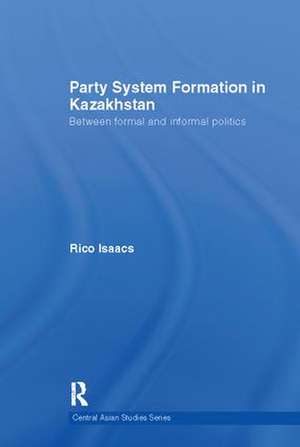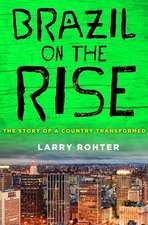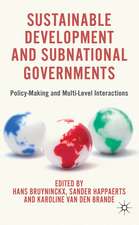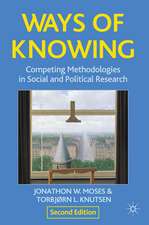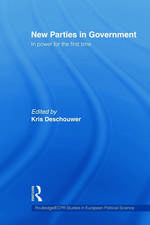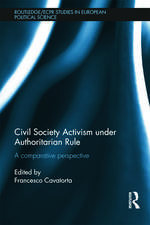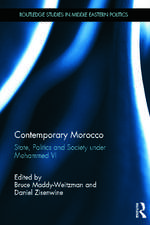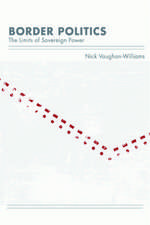Party System Formation in Kazakhstan: Between Formal and Informal Politics: Central Asian Studies
Autor Rico Isaacsen Limba Engleză Paperback – 24 mai 2017
Based on extensive interviews with political actors and a wide range of historical and contemporary documentary sources, the book utilises and develops neopatrimonialism as an analytical concept for studying post-Soviet authoritarian consolidation and failed democratisation. It illustrates how personalism of political office, patronage and patron-client networks and factional elite conflict have influenced and shaped the institutional constraints affecting party development, the type of emerging parties and parties’ relationship with society. The case of Kazakhstan, however, also demonstrates how in the former Soviet space political parties emerge as central to the legitimization of informal political behavior, the structuring of factional competition and the consolidation of authoritarianism. The book represents an important contribution to the study of Central Asian Politics.
| Toate formatele și edițiile | Preț | Express |
|---|---|---|
| Paperback (1) | 299.52 lei 6-8 săpt. | |
| Taylor & Francis – 24 mai 2017 | 299.52 lei 6-8 săpt. | |
| Hardback (1) | 850.37 lei 6-8 săpt. | |
| Taylor & Francis – 21 mar 2011 | 850.37 lei 6-8 săpt. |
Din seria Central Asian Studies
-
 Preț: 379.30 lei
Preț: 379.30 lei -
 Preț: 339.60 lei
Preț: 339.60 lei -
 Preț: 324.35 lei
Preț: 324.35 lei -
 Preț: 348.59 lei
Preț: 348.59 lei -
 Preț: 386.54 lei
Preț: 386.54 lei - 12%
 Preț: 299.52 lei
Preț: 299.52 lei - 18%
 Preț: 1164.44 lei
Preț: 1164.44 lei -
 Preț: 407.52 lei
Preț: 407.52 lei - 26%
 Preț: 764.20 lei
Preț: 764.20 lei - 18%
 Preț: 1057.75 lei
Preț: 1057.75 lei - 28%
 Preț: 821.06 lei
Preț: 821.06 lei - 18%
 Preț: 1111.40 lei
Preț: 1111.40 lei - 13%
 Preț: 297.57 lei
Preț: 297.57 lei - 18%
 Preț: 1058.79 lei
Preț: 1058.79 lei - 12%
 Preț: 312.77 lei
Preț: 312.77 lei - 19%
 Preț: 702.06 lei
Preț: 702.06 lei - 18%
 Preț: 1056.35 lei
Preț: 1056.35 lei - 18%
 Preț: 727.19 lei
Preț: 727.19 lei - 16%
 Preț: 260.93 lei
Preț: 260.93 lei - 18%
 Preț: 1218.34 lei
Preț: 1218.34 lei -
 Preț: 407.78 lei
Preț: 407.78 lei -
 Preț: 482.74 lei
Preț: 482.74 lei -
 Preț: 419.70 lei
Preț: 419.70 lei -
 Preț: 416.22 lei
Preț: 416.22 lei - 18%
 Preț: 1053.16 lei
Preț: 1053.16 lei - 15%
 Preț: 309.69 lei
Preț: 309.69 lei - 18%
 Preț: 1014.65 lei
Preț: 1014.65 lei -
 Preț: 436.14 lei
Preț: 436.14 lei - 18%
 Preț: 1057.05 lei
Preț: 1057.05 lei - 18%
 Preț: 1060.87 lei
Preț: 1060.87 lei - 26%
 Preț: 763.23 lei
Preț: 763.23 lei -
 Preț: 488.71 lei
Preț: 488.71 lei - 18%
 Preț: 1108.42 lei
Preț: 1108.42 lei - 18%
 Preț: 1057.05 lei
Preț: 1057.05 lei - 31%
 Preț: 767.47 lei
Preț: 767.47 lei
Preț: 299.52 lei
Preț vechi: 341.55 lei
-12% Nou
Puncte Express: 449
Preț estimativ în valută:
57.31€ • 59.84$ • 47.43£
57.31€ • 59.84$ • 47.43£
Carte tipărită la comandă
Livrare economică 04-18 aprilie
Preluare comenzi: 021 569.72.76
Specificații
ISBN-13: 9781138102347
ISBN-10: 1138102342
Pagini: 240
Ilustrații: 12
Dimensiuni: 156 x 234 mm
Greutate: 0.45 kg
Ediția:1
Editura: Taylor & Francis
Colecția Routledge
Seria Central Asian Studies
Locul publicării:Oxford, United Kingdom
ISBN-10: 1138102342
Pagini: 240
Ilustrații: 12
Dimensiuni: 156 x 234 mm
Greutate: 0.45 kg
Ediția:1
Editura: Taylor & Francis
Colecția Routledge
Seria Central Asian Studies
Locul publicării:Oxford, United Kingdom
Public țintă
PostgraduateCuprins
1. Introduction: In-between the Informal and Formal - Introducing Party Development in Kazakhstan and Central Asia 2. Neopatrimonialism and Party Development: A Framework for Analysis 3. Uncertain Transition: The Development of Neopatrimonialism in Kazakhstan 4. The Institutional Constraints on Political Parties: Presidency, Elections and the Law on Political Parties 5. What Type of Parties? Membership, Organisation, Ideology and Behavioural Norms 6. Passiveness and Disconnection: Parties and Society in Kazakhstan 7. Conclusion: Patrimonial Politics and Party Development Beyond Kazakhstan
Notă biografică
Rico Isaacs is a Lecturer in International Studies at Oxford Brookes University, UK. His research interests include the relationship between formal and informal politics, institutional development and authoritarianism and democracy in the former Soviet Union.
Recenzii
In his text, Rico Isaacs explains how Kazakh society has avoided fragmentation along party lines by showing that Kazakh political parties do not operate on ethnic, religious, or racial grounds, while, in contrast, the experience in Kyrgyzstan exposes how the "ethnic card" can easily be played in Central Asia. Isaacs offers an innovative analysis of post-Soviet Central Asian politics. The book is based on a PhD thesis rich in theoretical interpretation, in-depth fieldwork, and historical analysis as the author takes into account the spectrum of external global and regional influences on party politics in Kazakhstan.
Farkhad Alimukhamedov PhD
Turgut Özal University, Ankara
Farkhad Alimukhamedov PhD
Turgut Özal University, Ankara
Descriere
Since the collapse of the Soviet Union, Central Asian states have developed liberal-constitutional formal institutions. However, at the same time, political phenomena in Central Asia are shaped by informal political behaviour and relations. This relationship is now a critical issue affecting democratization and regime consolidation processes in former Soviet Central Asia, and this book provides an account of the interactive and dynamic relationship between informal and formal politics through the case of party-system formation in Kazakhstan.
